Discover the delights of a traditional Moroccan breakfast. This article explores the flavors and customs of this wonderful morning meal. Learn how to bring a touch of Morocco to your table.
Exploring the Flavors of a Moroccan Breakfast
A Moroccan breakfast is a simple yet flavorful affair. It focuses on fresh ingredients and warm hospitality. Therefore, it’s a fantastic way to begin your day. Indeed, it’s a meal that is full of culture.
What Makes a Moroccan Breakfast Unique?
Moroccan breakfasts are quite different from typical Western ones. Chiefly, they are not as heavy. Additionally, they often include bread, olives, cheese, and honey. Consequently, it is a meal that balances sweet and savory flavors.
A Moroccan breakfast has its own unique flavors and ingredients, however, if you would like to compare and contrast with other breakfast styles, you may like our article on Naturally European Breakfast Delights.
Traditional Elements of a Moroccan Breakfast
There are several key elements that make up a Moroccan breakfast. Specifically, these items are often included in most morning meals. Therefore, understanding these ingredients is very helpful.
Bread: A Moroccan Breakfast Staple
Bread is absolutely essential to a Moroccan breakfast. Generally, several types of bread are served. For instance, khobz (a round loaf) and msemmen (a flaky flatbread) are common. Moreover, they are used to scoop up other parts of the meal.
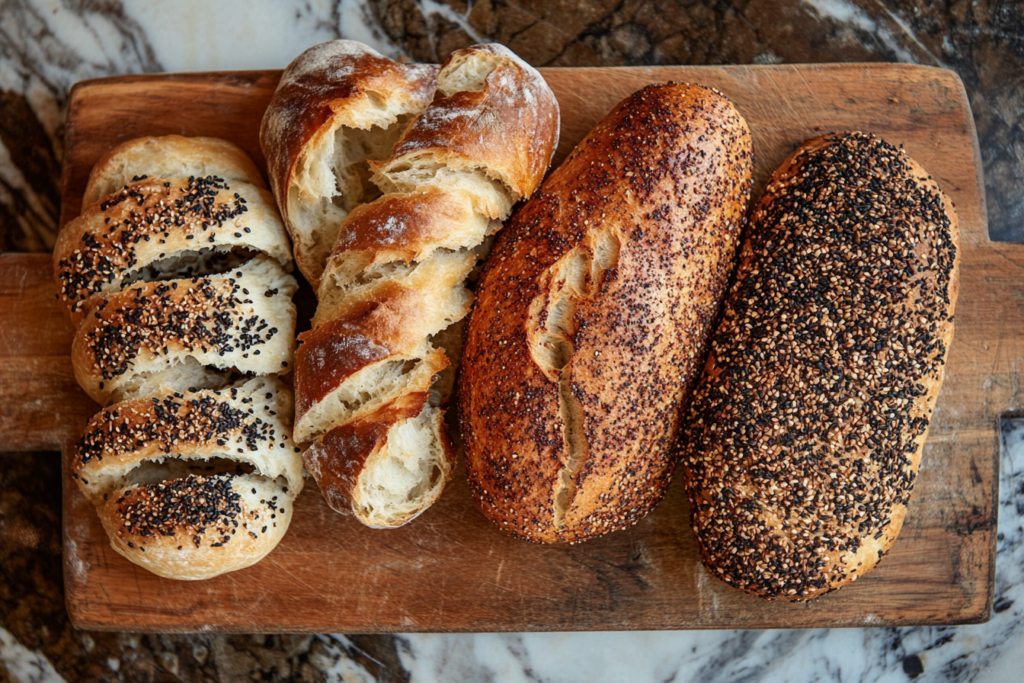
- Khobz: A very common bread, this round loaf is a staple.
- Msemmen: This is a flatbread that is folded into squares. It can be cooked plain, or with different fillings.
- Baghrir: These are small spongy pancakes. They’re often called “thousand hole pancakes.”
Spreads and Dips in a Moroccan Breakfast
Various spreads and dips enhance a Moroccan breakfast. Accordingly, they offer different tastes and textures. Furthermore, they are an easy way to add more flavor.
Amlou: A Sweet Moroccan Dip
Amlou is a popular Moroccan spread. Basically, it is made from almonds, argan oil, and honey. Therefore, it is a sweet and nutty choice. In addition, it is a common breakfast item in Morocco.
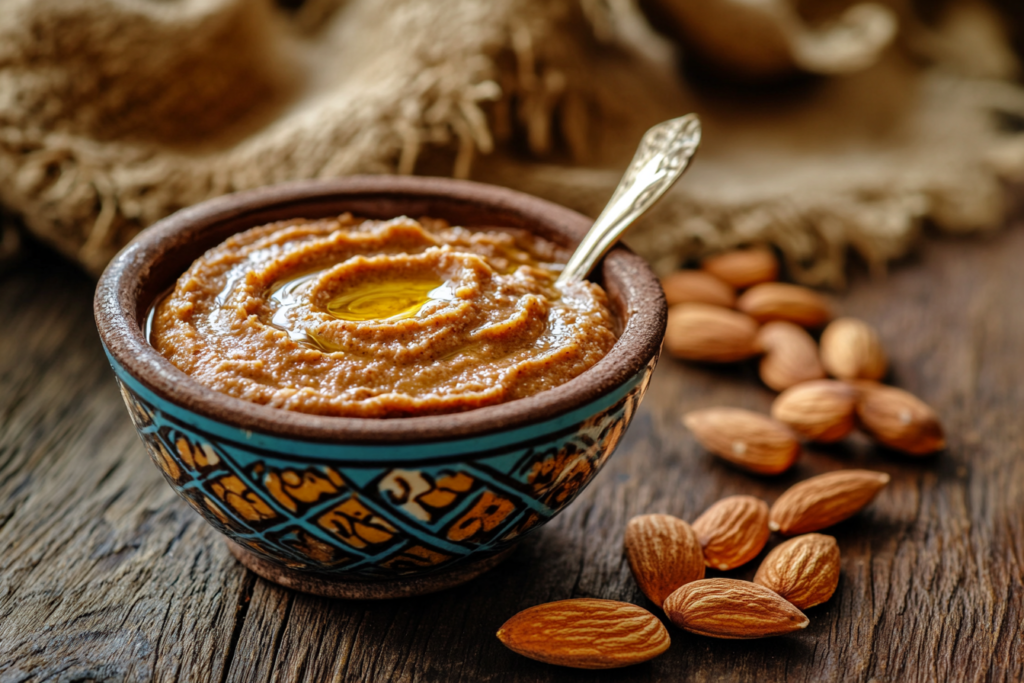
Olive Oil and Olives in Moroccan Breakfast
Olive oil and olives are often served. Comparatively, they provide a savory contrast to the sweetness of other foods. Similarly, they add a rich flavor to the meal. Additionally, they are quite healthy.
Cheese and Jams in a Moroccan Breakfast
Cheese and jams are also frequently part of a Moroccan breakfast. Specifically, soft cheese is a common choice. Likewise, fruit jams provide more sweetness. However, you can use different types of cheese and your preferred jam.
- Soft Cheese: A great option that is often served.
- Fruit Jam: Jams provide a sweet element to your breakfast.
Beverages: Completing Your Moroccan Breakfast
Generally, a Moroccan breakfast is served with beverages. Specifically, these drinks often include mint tea or coffee. Thus, they help to round out the flavors of the meal.
Mint Tea: An Essential Moroccan Drink
Mint tea is not just a drink. It’s a symbol of Moroccan hospitality. Explicitly, it is made with green tea, fresh mint, and sugar. Therefore, it is the perfect compliment to a Moroccan breakfast. Indeed, it is served hot and very often in a glass.
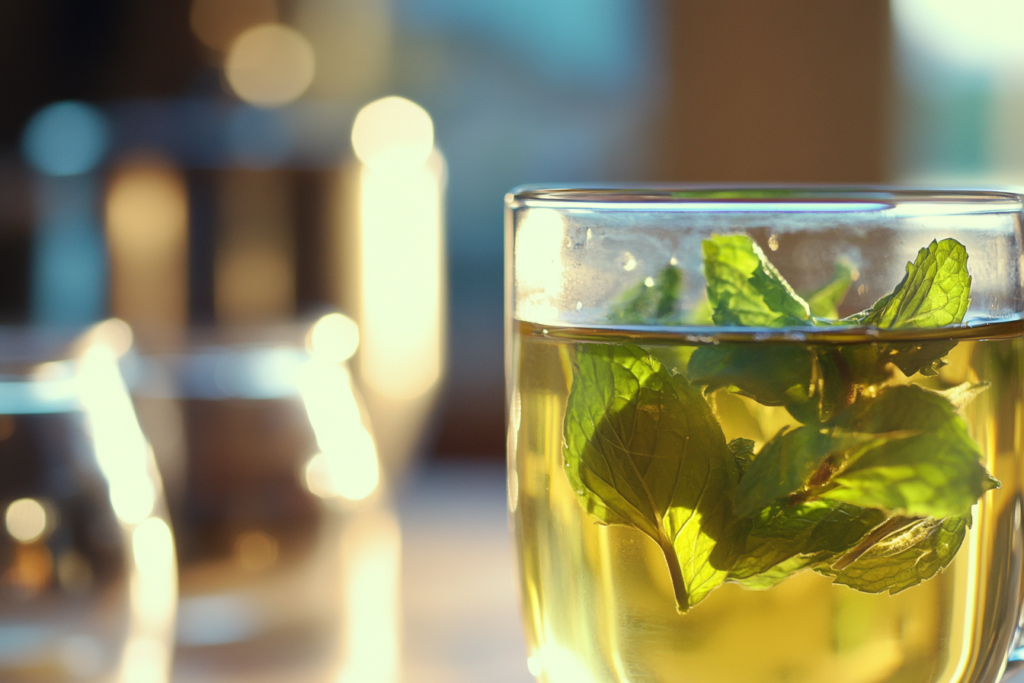
Coffee: A Common Choice
Coffee is another drink often enjoyed with a Moroccan breakfast. Chiefly, it can be served plain or with milk and sugar. Eventually, it’s a preference to individual taste.
Typical Dishes in a Moroccan Breakfast
While the items mentioned above are always present, there are a few other dishes that are frequently part of a Moroccan breakfast. Particularly, they are very common in Morocco. Thus, they give more variety to the meal.
Beghrir: The Thousand-Hole Pancake
Beghrir, or the thousand-hole pancake, is a Moroccan specialty. Basically, it is a small, spongy pancake. Furthermore, it is made from semolina flour and has many tiny holes. Afterward, it is often served with honey or butter.
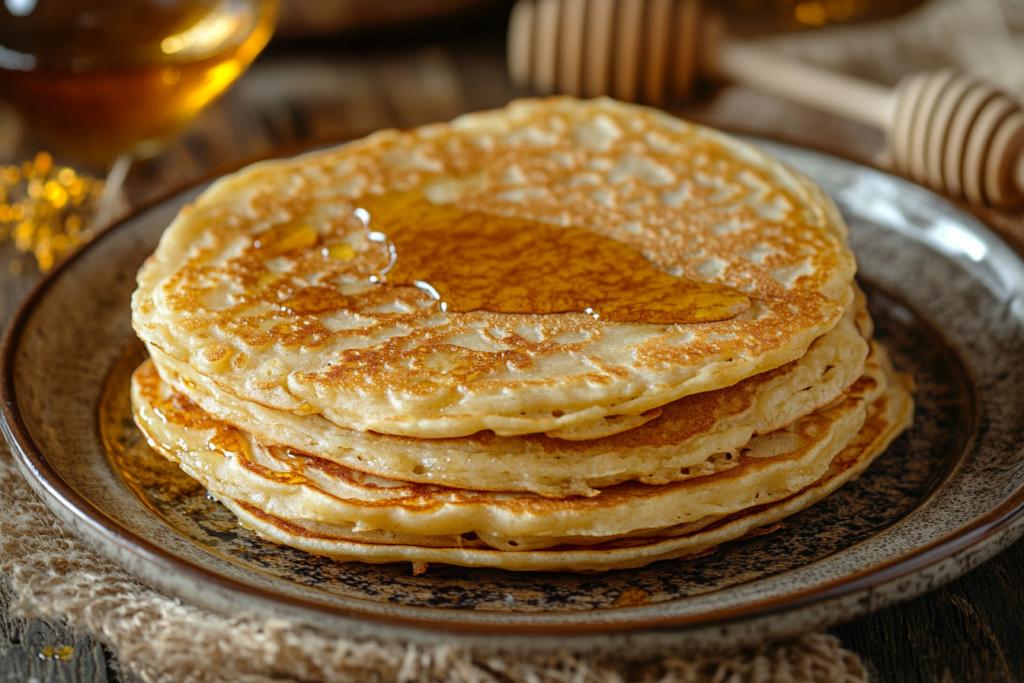
Harcha: A Semolina Flatbread
Harcha is another common flatbread. Specifically, it’s made from semolina. Moreover, it’s cooked on a griddle and can be served with butter or jam. Basically, it’s a very common choice for breakfast in Morocco.
Khlea: Dried Beef
Khlea is a special type of dried beef. Generally, it is cooked with eggs. Accordingly, this adds a protein element to the Moroccan breakfast. Additionally, it is a very flavorful addition to the meal.
Moroccan Breakfast Customs and Traditions
There are many traditions surrounding a Moroccan breakfast. Undoubtedly, it’s a very important time of day for families. Therefore, exploring these traditions can enhance your experience.
Family-Oriented Meal
Moroccan breakfast is very family-oriented. Specifically, it’s a time for families to come together. Thus, this promotes a sense of togetherness. In addition, it is a time to start the day together.
Hospitality: Sharing Food
Hospitality is also a major part of Moroccan culture. Accordingly, food is often shared with guests. Likewise, offering food is a great way of showing warmth. Therefore, if you are invited for a Moroccan breakfast, you should expect a very generous spread.
Using Hands to Eat
Moreover, bread is often used to scoop up food in Moroccan breakfast. However, utensils are also used. Nevertheless, it is common to eat some of the food with your hands.
Making Your Own Moroccan Breakfast
It’s actually easy to make your own Moroccan breakfast at home. Generally, most of the ingredients are easy to find. Therefore, you can enjoy these flavors in your kitchen.
Simple Steps to a Moroccan Breakfast
- Choose Your Bread: Decide which type of bread you prefer.
- Prepare Spreads: Amlou, olive oil, and jams are great.
- Brew Tea: Make fresh mint tea to serve with your meal.
- Set Up a Table: Arrange your food attractively for an elevated experience.
- Enjoy: Share your meal with family and friends to enjoy the full experience.
Finding Authentic Ingredients
Most of the ingredients for a Moroccan breakfast can be found at international food stores. However, some items, like argan oil, may need to be purchased online. Nevertheless, you can always substitute for similar items.
Adapting to Your Tastes
Furthermore, feel free to adapt the recipes to your tastes. For example, use different jams or cheeses. However, don’t be afraid to make it your own. Consequently, this lets you enjoy this meal in your own way.
Health Benefits of a Moroccan Breakfast
Moroccan breakfast, like most other meals, has its own health benefits. Chiefly, many items are nutritious and provide a good start to your day. Therefore, it’s a meal that is both delicious and good for you.
Emphasis on Fresh Ingredients
The focus on fresh ingredients is beneficial. For instance, fresh bread, olives, and fruits provide vitamins and minerals. Also, these ingredients are a good part of a healthy diet.
Healthy Fats and Proteins
Olive oil and argan oil are sources of healthy fats. Comparatively, cheese and khlea provide protein. Therefore, these macronutrients are very essential to good health.
Moderation in Sugar
While honey and jams are part of a Moroccan breakfast, they are used in moderation. Likewise, mint tea, while sweet, is not rich in calories. Thus, it is a balanced way to have a sweet component in your diet.
Moroccan Breakfast for Special Diets
The good thing is a Moroccan breakfast can be adjusted for certain diets. For example, it’s easy to adapt the meal for those who are vegetarian. However, it can also be flexible enough to use with other diets.
Vegetarian Options
Vegetarians can enjoy most parts of a Moroccan breakfast. Particularly, they can use bread, olives, jams, cheese, and mint tea. Similarly, you can focus on items like amlou, beghrir, and harcha. Thus, it provides a great selection of choices.
Gluten-Free Adaptations
Gluten-free adaptations are possible. Chiefly, gluten-free bread options can be used. Likewise, beghrir can be made with gluten-free flours. Therefore, this allows many to enjoy a Moroccan breakfast.
Considerations for Diabetics
Diabetics should moderate the amount of sweet components in their Moroccan breakfast. For instance, they can choose unsweetened jams or use less honey. Therefore, mindful choices will make it compatible with a diabetic diet.
The Cultural Significance of Moroccan Breakfast
Beyond just food, the Moroccan breakfast holds deep cultural value. Specifically, it’s about connection and tradition. Therefore, understanding its significance enhances the experience.
A Time for Connection
The Moroccan breakfast is not just a meal. Basically, it’s an opportunity for family and friends to connect. Indeed, this daily ritual strengthens bonds. Moreover, it encourages open conversations. Thus, it is more than just eating.
Respect for Tradition
Additionally, the Moroccan breakfast reflects a deep respect for culinary traditions. Chiefly, the recipes have been passed down through generations. Therefore, preserving the authenticity of each dish is valued. Furthermore, this emphasizes the importance of heritage.
The Art of Presentation
The way a Moroccan breakfast is presented is also key. Generally, the food is arranged beautifully. Also, care is taken to create a welcoming table. Accordingly, this shows appreciation for the meal. Therefore, the presentation enhances the experience of eating.
Regional Variations in Moroccan Breakfast
While there are common threads, a Moroccan breakfast can differ slightly across regions. Specifically, different areas may include local specialties. Therefore, it is fascinating to learn about these variations.
Breakfast in Coastal Regions
In coastal regions, a Moroccan breakfast often includes fresh seafood. For example, sardines and other fish can be part of the meal. Similarly, olive oil and olives, which are widely available, are always part of the breakfast.
Breakfast in Mountainous Areas
In the mountains, the breakfast tends to be heartier. Chiefly, this is due to the colder climate and need for energy. For instance, khlea (dried beef) is more common in these areas. Likewise, breads made with whole grains may be used.
Breakfast in Urban Cities
In cities, the Moroccan breakfast can include a wider array of options. For example, bakeries often sell pastries. Additionally, you might find different types of cheeses and jams. Thus, there is a great variety.
Moroccan Breakfast and Hospitality
The hospitality associated with a Moroccan breakfast is very notable. Chiefly, it’s a way to show kindness. Therefore, it is important to remember when experiencing this meal.
Welcoming Guests
When guests are invited for a Moroccan breakfast, they are treated very well. Specifically, the best foods are offered. Similarly, mint tea is served as a sign of welcome. Furthermore, this reflects the importance of community.
Sharing Food
Sharing food is at the heart of Moroccan hospitality. Accordingly, everyone is encouraged to partake from the same dishes. Likewise, bread is used to scoop food and pass it along. Therefore, this enhances the communal aspect of the meal.
The Importance of Conversation
Moreover, conversation is an integral part of Moroccan breakfast. Indeed, it is a time for people to connect. Thus, it encourages a comfortable and warm atmosphere. Hence, the meal is not rushed and is enjoyed slowly.
Moroccan Breakfast: A Culinary Adventure
In conclusion, a Moroccan breakfast is more than just a meal. Basically, it is a cultural experience. Indeed, it provides a great way to explore flavors, customs, and hospitality. Therefore, try creating your own version of this wonderful meal to discover new tastes and traditions.
Nutritional Information for a Typical Moroccan Breakfast
| Food Item | Serving Size | Calories | Protein (g) | Fat (g) | Carbs (g) |
| Khobz (Bread) | 1 slice | 75 | 2 | 1 | 15 |
| Msemmen (Flatbread) | 1 piece | 150 | 4 | 5 | 22 |
| Baghrir | 1 pancake | 60 | 1.5 | 0.5 | 12 |
| Amlou (Dip) | 1 tablespoon | 100 | 2 | 9 | 4 |
| Olive Oil | 1 tablespoon | 120 | 0 | 14 | 0 |
| Olives (Green) | 10 | 40 | 0.5 | 4 | 2 |
| Soft Cheese | 1 ounce | 80 | 6 | 6 | 1 |
| Fruit Jam | 1 tablespoon | 50 | 0 | 0 | 13 |
| Mint Tea | 1 cup | 20 | 0 | 0 | 5 |
| Coffee | 1 cup | 5 | 0.5 | 0 | 1 |
Please Note: These nutritional values are estimates and can vary based on specific ingredients and portion sizes.
Frequently Asked Questions (FAQs)
What is a traditional Moroccan breakfast?
A traditional Moroccan breakfast typically consists of bread, olive oil, olives, cheese, and jams. In addition, it is usually served with mint tea.
What is a typical breakfast in Marrakech?
In Marrakech, a typical breakfast often includes khobz, msemmen, amlou, and mint tea. Additionally, local varieties of jams and cheeses may be used.
What do Moroccans traditionally eat with?
Moroccans traditionally use bread to scoop up food. Specifically, this is very common for breakfast, lunch, and dinner. However, spoons and other utensils are also common.
What are three traditional breakfast dishes?
Three traditional Moroccan breakfast dishes are beghrir, harcha, and khlea with eggs. Furthermore, these are eaten along with other common ingredients.
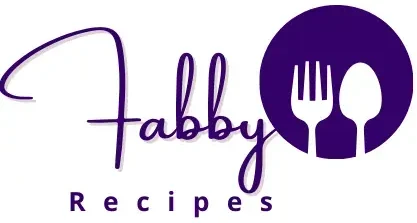
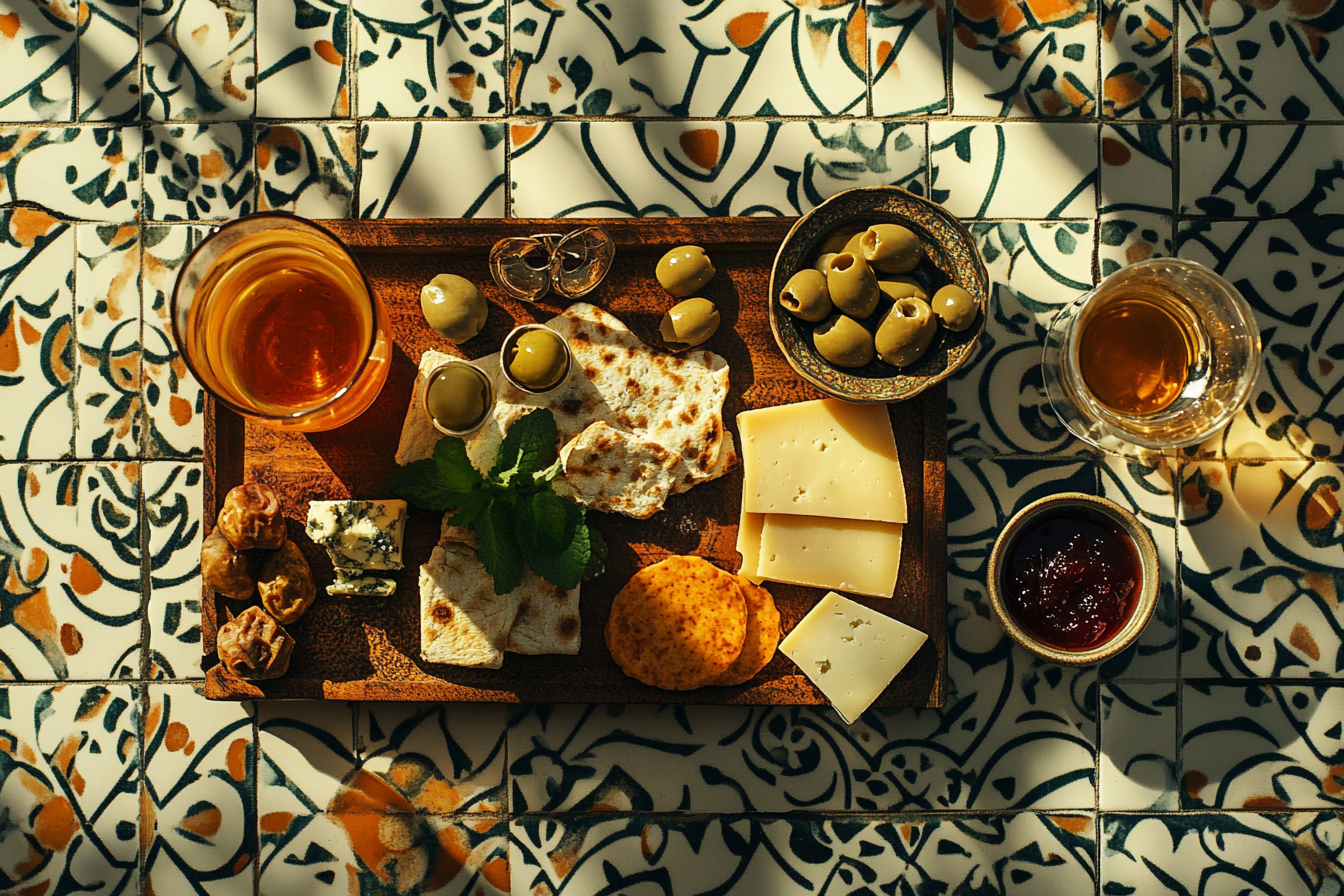
1 thought on “Taste of Morocco: Moroccan Breakfast”